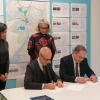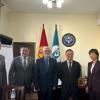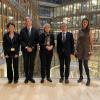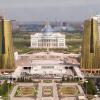News
Displaying Results 176 - 200 of 434
A UNECE working paper released today, Population and migration statistics in Armenia: current situation, future plans and ways to improve describes how Armenia is improving its statistics on population and migration by combining administrative data with sample surveys. The study reviews innovations…
Joint efforts to harmonize data collection, strengthen monitoring and data exchange on water quality, develop early warning systems on water pollution at transboundary waters and improve collection and sharing of data on transboundary aquifers are needed for effective regional cooperation in…
While Uzbekistan has improved its environmental performance in line with the Sustainable Development Goals (SDGs) related to water and sanitation (SDG 6) and forests and tree cover loss (SDG targets 15.1, 15.2, 15.3), significant challenges remain related to air quality (SDG 11.6), water resources…
Decarbonizing industry remains a key challenge for climate action: according to the International Energy Agency, industrial activity was directly responsible for emitting 9.4 Gt of CO2 in 2021, accounting for a quarter of global emissions (not including indirect emissions from electricity used for…
UNECE is mobilising international architects to help the city of Mykolaiv, Ukraine’s ninth largest city, to develop a forward-looking, people-centred master plan for its reconstruction.
Since July 2022, UNECE has engaged One Works, an international design company in Milano, Italy, to provide…
At its seventy-seventh meeting (Geneva, 13–16 December 2022), the Compliance Committee of the UNECE Convention on Access to Information, Public Participation in Decision-Making and Access to Justice in Environmental Matters (Aarhus Convention) invited fourteen Parties to attend open sessions to…
It is critical that construction industry’s general contractors, architects and governments find ways to innovate and incorporate minimum efficient standards and innovations, such as architectural upcycling and recycling, through proper and updated legislative frameworks and rules as well as…
In the past years, Central Asia has been facing major climate-change related challenges – drought, floods, desertification, sandstorms, extreme cold and heat spells – and many more. Not only have these affected rural areas, but cities have been suffering, too. Accentuated by increased traffic…
Despite a marked overall improvement over the last ten years of the economic picture in Bishkek, Kyrgyzstan, urban planning lagged, and the development of basic and social infrastructure did not keep up with population increase, particularly in informal settlements. According to estimates shared…
With climate and biodiversity loss heading the news these days, another problem related to the planet we all share is often forgotten: air pollution. Air pollution has an enormous burden on public health, ecosystems, climate, and ultimately, the economy. Globally, the World Health Organization (…
A dilemma has galvanised the Public-Private Partnerships (PPPs) and infrastructure community for some time: How to ensure the bankability of pipelines of sustainable projects in emerging economies. PPP lenders and debt-providers continue to argue that there are not enough bankable projects to…
The UNECE Protocol on Pollutant Release and Transfer Registers (PRTRs) continues to support actions to promote transparency in environmental matters across the globe. It drives the development of national legislation and practice towards a common set of international standards, bringing about…
During her recent two-day visit to Turkmenistan UNECE Executive Secretary Olga Algayerova spoke at international conference “Dialogue is a Guarantee of Peace” in Ashgabat and discussed areas of cooperation with the highest government officials, focusing on future circular, digital and green…
A UNECE delegation headed by Deputy Executive Secretary Dmitry Mariyasin has visited the headquarters of the European Investment Bank (EIB) in Luxembourg to hold annual consultations and strengthen partnership between two institutions.
The meeting came in the aftermath of the discussion held by…
United Nations Secretary-General António Guterres noted that two seismic shifts will shape the 21st century: the climate crisis and digital transformation. Just as international cooperation is crucial to preserving the health of the planet, it is also needed to reap the benefits of digital…
During its recent mission in Turkmenistan, a UNECE delegation presented a proposal for a new analytical project - “Trade and Innovation for Sustainable Development of Turkmenistan” - to the government and international stakeholders, aimed at supporting the country to enhance innovation governance…
“It's now or never, if we want to limit global warming to 1.5°C”, stated the IPCC authors earlier this year. “Without immediate and deep emissions reductions across all sectors, it will be impossible”, they continued.
With worsening climate effects all over the world, all eyes turned to COP27…
UNECE and the QazTrade Center for Trade Policy Development are joining forces to advance sustainable trade and the circular economy in Kazakhstan. Kazakhstan is the first country in Central Asia to use the SPECA Principles of Sustainable Trade - a set of twenty principles, adopted by the countries…
The transition from linear to circular economies requires fundamental rethinking of trade policies and regulations. “Harmonized System” codes (HS codes) are a key pillar of the tariff infrastructure for international trade. These HS codes were designed at a time when circular economy considerations…
This year marks the 30th anniversary of the UNECE Convention on the Transboundary Effects of Industrial Accidents. This unique international legal instrument, signed on 17 March 1992 and in force since 2000, helps to protect people and the environment from the devastating effects of industrial…
Eight years remain to achieve the United Nations Sustainable Development Goals (SDGs), and yet, the world is not on track to attaining most of the targets. We are far from a fully realized circular economy transition, or from limiting the rise in global temperatures to 1.5 degrees Celsius.
The…
Innovation will be crucial for rebuilding Ukraine’s economic and social systems to ensure the country’s long-term prosperity, resilience and sustainability. To support Ukraine in addressing these challenges, UNECE organized a study tour to Geneva for three Ukrainian officials.
The study tour (14-…
How to develop projects, initiatives and ideas to build resilient energy systems in Central Asia? This was the focus of the 2nd Almaty Energy Forum, held from 14-16 November at the Kazakh-British Technical University. The Forum, a joint effort of four UN organizations – Economic Commission for…
The tenth meeting of the Task Force on Public Participation in Decision-making under the Aarhus Convention (Geneva (hybrid), 10–11 October 2022) focused on effective public participation in decision-making in the context of the coronavirus disease (COVID-19) pandemic and on health-related issues…
Armenia has been a pioneer in the use of the Public-Private Partnerships (PPPs) model in the Caucasus to improve its infrastructure and public services. In 2000, nine years since its independence, it concluded its first wave of water concession agreements for the provision of drinking water and…
























